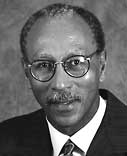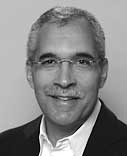A legendary basketball player turned successful entrepreneur and community leader, a celebrated architecture historian and critic and a groundbreaking social scientist will receive honorary degrees from the University during Winter Commencement.
Dave Bing, who will receive an honorary Doctor of Laws degree, is the commencement speaker. He is founder and chairman of the Bing Group, a steel services company and automotive parts manufacturer.
Ada Louise Huxtable, currently architecture critic for the Wall Street Journal, will receive an honorary Doctor of Humane Letters degree and Claude Steele, Lucie Stern Professor in the Social Sciences and director of the Center for Advanced Study in the Behavioral Sciences at Stanford University, will receive an honorary Doctor of Science degree.
The ceremony is at 2 p.m. Dec. 17 in Crisler Arena; doors will open at 1:15 p.m. Seating is general admission and tickets are not required.
Bing, named one of the 50 Greatest Players in National Basketball Association History in 1996, had a playing career of 11 years beginning in 1966, which included nine notable seasons with the Detroit Pistons. He was elected to the Basketball Hall of Fame in 1990 and his No. 21 was the first number to be retired by the Pistons.

Born in Washington, D.C., Bing earned a Bachelor of Arts in economics and marketing at Syracuse University, where he also was a star basketball player and All-American, graduating in 1966.
His desire to fulfill a childhood dream of owning his own company led him to found Bing Steel in Detroit in 1980. He started his business during one of the worst recessions in the steel industry and not only battled the economy, but the prejudice and stereotypes he encountered as both an African American and a former athlete.
Within 10 years the company generated substantial growth, and Bing diversified the enterprise by creating four other automotive supply companies, today known collectively as The Bing Group. Strongly committed to the development of Detroit, when Bing could not find enough qualified workers to hire, he partnered with Ford Motor Co. to establish a training facility in 1999.
Huxtable has made a profound impact on architectural criticism for over half a century and essentially is credited with inventing the field for a general audience. She has articulated the premise that architecture can change lives, and has asserted that architects and planners must be held accountable for their designs.
Born in New York City, Huxtable earned her bachelor’s degree from Hunter College in 1941 and proceeded to graduate study at the Institute of Fine Arts at New York University. Her early career included work as a curator at the Museum of Modern Art, appointment as a Fulbright Scholar for research in Italy and a Guggenheim Fellowship.
She was appointed as the first architecture critic of The New York Times in 1963, a position created for her, and one that she held for 20 years. She was awarded the first Pulitzer Prize for Distinguished Criticism in 1970 and received one of the earliest MacArthur Foundation Fellowships in 1981, allowing her to leave the Times in order to write books full time. In her most recent, “The Unreal America: Architecture and Illusion,” she warns “that impoverishment of the human spirit (has) become politically and aesthetically correct.”
Colleagues say Steele has revolutionized the ways of viewing the impact of prejudice and stereotypes by showing that individual performance and group perception are influenced dramatically by stereotypical preconceptions. Growing up in Chicago in the 1940s, he experienced firsthand the impact of being marginalized in a segregated society, and learned the power of social action from his parents, who deeply were involved in the civil rights and school desegregation movements.

He earned a bachelor’s degree from Hiram College and a doctoral degree in psychology from The Ohio State University. Steele’s path-breaking research has demonstrated the strong influence of what he has termed the “stereotype threat”: the ways that a negative group stereotype adversely can affect intellectual performance and intergroup relations.
Steele began his academic career at the University of Utah, followed by lengthy appointments as a faculty member at the University of Washington and U-M. He joined the psychology department at Stanford University in 1991.
His investigation into the self-image threat grew out of his work at U-M, where he designed a series of sophisticated studies that showed when intelligent people are confronted with challenges to their ability, the fear of confirming negative stereotypes can hurt their performance—and conversely, when that challenge is removed, performance improves measurably. He provided an expert report to the courts in the University’s admissions cases that were decided in the Supreme Court
For a graduate’s guide to commencement go to www.umich.edu/~gradinfo/.

